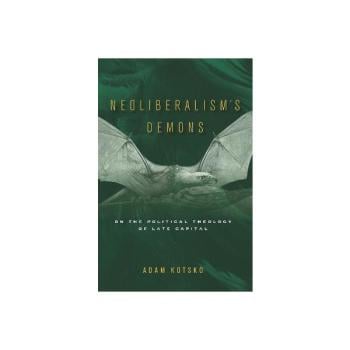Here I return to discussion of theologian Adam Kotsko’s book Neoliberalism’s Demons: The Political Theology of Late Capital with Chapter 4 “This Present Darkness.” If you have read the chapter, feel free to comment. If not, you may ask a question.
Two things jumped out of me from this chapter—the chapter title and the title of one of its sections. “This Present Darkness,” of course, is the title of Frank Peretti’s bombshell best seller fictional book about Satan and demons influencing America. The title of the chapter’s second section is “I Wish We’d All Been Ready” which is, of course, the title of Larry Norman’s anthem of the Jesus People Movement.
As for the content of the chapter, I was disappointed. It is a very difficult chapter to read with many references to scholars and politicians.
One thing I figured out, I think, is that Kotsko believes neoliberalism has three “types” in America that have happened basically in sequence: combative, normative, and punitive. But I won’t go into those. I’m not sure I understand them.
In this chapter Kotsko is asking if neoliberalism’s “reign” is coming to an end and what might take its place. He asks “How long can people tolerate living in a society where every opportunity and promise is convertible into a threat and a trap?” (124) He is referring to, for example, government subsidized or guaranteed education loans. They are the one debt that cannot be negotiated through bankruptcy.
Let’s remind ourselves what neoliberalism is according to Kotsko (but not only him). It is belief that the free market cannot be wrong. In other words, if the economic, financial marketplace is truly free from government interference, it will always work for the best. Those who choose to participate will benefit. According to Kotsko, neoliberalism is a moral order, not just an economic order. It idolizes the free market and demonizes those who fail to benefit from it.
According to Kotsko “It is precisely the generation that has known nothing but neoliberalism [last decades of the 20th century and first decades of the 21st century—in America] that is most likely to reject it.” (125) That because “neoliberalism is not sustainable.” “The very strategies that it uses to justify itself and its outcomes inevitably create subjects who are anxious, ashamed, resentful, and exhausted. It may well hold out through inertia or through presenting itself as a lesser evil compared to the right-wing reaction, or it may attempt to convert itself into a more overtly coercive order. But neoliberalism will never again appear as the righteous insurgent of the combative period or as the self-evident order of the normative period.”
I wonder what Kotsko would say today (2024)? It seems to me that the right-wing reaction (Tea Party, Trumpism) has adopted many of the beliefs and strategies of neoliberalism—small government, economic freedom, little to no government regulation of the economy, etc. Trump is surely not “liberal” in the classical sense, but is he not neoliberal in the sense Kotsko means it? “Only the weak will fail.” Trump meant—in his envisioned new America where economic competition will be unhindered by government regulations and redistribution of wealth.
What is neoliberalism if not an expression of a deeper political theology—Social Darwinism? And how can Social Darwinism be Christian? How can Christians adopt Social Darwinism or embrace it? They can’t—without revising their Christianity radically so that it is unrecognizable.
*Note: If you choose to comment, make sure your comment is no more than 100 words. If you have not read the chapter, don’t comment. You may ask a question only. In any case, make sure your comment or question is on topic, addressed to me, civil and respectful (not hostile or argumentative), and devoid of pictures or links.*


















